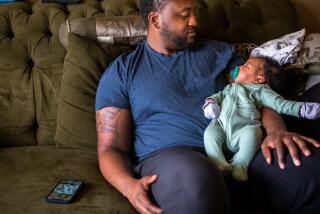The Religious Pursuit of Sleep
- Share via
Now I lay me down to sleep,
I pray the Lord my soul to keep.
Or, short of that, Lord, how about a decent night’s shut-eye?
Bedtime prayers are a common ritual. But these days, prayer is a lot more than just a private chat with the Big Guy. Prayer has been linked to faster recovery from surgery, lower risk of heart attack and other health benefits. This month, an analysis of 42 previous studies showed that public and private religious involvement (including prayer) may lead to a longer life.
But can prayer help you sleep well? People often say their prayers at night, and a lot of Americans are slumber-impaired. A recent National Sleep Foundation poll found that nearly 60% of adults suffer from insomnia, and that most get less sleep than they need.
Drowsy Americans are slower to recover from illness and injury, are more likely to have car accidents and are more likely to have certain psychiatric problems.
*
Those who pray--and those who study prayer and the impact of spiritual practices on health--believe that certain kinds of prayers may help bring on the snoozing, although there isn’t much specific research to support this.
Tudy Hill of West Hartford, Conn., confesses to dropping off while reading a book on many nights. But when she prays, she imagines herself “in the arms of God, or some spiritual kind of metaphor like that, almost a floating cloud that is upheld by the spirit. That really does help me go to sleep.”
Prayer is likely to help in a number of ways, according to researchers. It can be a nighttime ritual that helps us relax. Dr. Daniel McNally, director of the sleep disorders center at the University of Connecticut Health Center in Farmington, called such a practice a sleep-onset association.
“It’s part of the actions that signify to me that I’m going to bed,” he said. “Prayer or meditation or relaxation techniques, they are relaxing, and [sleepers] learn to associate that set of behaviors with going to sleep.”
*
Dr. Herbert Benson, an associate professor of medicine at Harvard Medical School, developed the Relaxation Response, a widely used meditation technique that involves the use of a repeated word, phrase or sound. He said a repeated word or physical motion is a traditional method for falling asleep. Counting sheep is a perfect example of this. Prayer along these lines can be very helpful, he said, especially if one uses the technique a couple of times during the day as well.
That’s what Rabbi Stephen Fuchs does when he meditates a couple of times each week. Fuchs is senior rabbi at Congregation Beth Israel in West Hartford. “I use the ‘Sh’ma’ as a mental device,” he said, naming one of the basic prayers of Judaism, taken from the book of Deuteronomy. Nighttime prayer, he said, is “often a very personal unloading.”
And that “unloading” is another sleep-inducing function of prayer: It can help clear the mind of the day’s cares. In that way, it is similar to secular techniques that are taught to insomniacs to help them drop off, said Dr. Charles F. Reynolds III, a professor of psychiatry at the University of Pittsburgh and director of the school’s intervention research center for late-life mood disorders.
“They teach people [with insomnia] how to focus their minds, get rid of extraneous thought and not bring the troubles of the day into bed,” he said.
Of course, prayer can be agitating too. If your bedtime prayer is a catalog of your troubles and woes, it’s not going to be restful, warned the Rev. Amy Fallon, assistant rector at Trinity Episcopal Church in Hartford, Conn.
*
No one really knows if the prayerful lie down and sleep more peacefully than others. There is no body of comparative research. But Reynolds and his colleagues examined the quality of sleep of a group of healthy, elderly Roman Catholic nuns, members of Sisters of Divine Providence in Pittsburgh. They found that these women--who were still living active lives of service and prayer--slept better than a similar group of nonreligious seniors.
“Their sleep was superior in continuity and depth,” Reynolds said. “They had younger-looking sleep than the nonreligious control women.”
He and his coauthors felt that the highly regulated schedule of their busy lives accounted for their enhanced snoozing. They were spending 30 minutes to an hour less in bed than the nonreligious group. But they seemed to make up for this by maximizing the quality of their sack time.
Reynolds said the nuns were not convinced by his scientific description. They told him they felt that because of their religious commitment and calling they had clear consciences and, therefore, slept better.
“Their view was, ‘Doc, your psychological explanations are fine, but really, it’s the guy [God] we’re married to,’ ” Reynolds said. “I like their explanation as well as I like mine.”


